So I was expecting exotic diseases, and looking forward to living, for a little while, in a different culture, but I was not prepared for the prevalence of family violence. I should have expected it. Years ago, I authored a book chapter called “Intimate Partner Violence in Immigrant Women”. While doing research for the book, I found out that the prevalence of domestic violence in rural areas South America (I can’t remember now if it was Ecuador or Peru) approached 70%. We have had some capacitación for our staff in term of domestic violence, but every single day there is a police officer knocking on the door of the consultorio, with some new survivor of violence to be examined.
In many cases of domestic violence, both parties have injuries. Having heard many stories of domestic violence during the years I ran the support group at the Prieto clinic, my inclination is to have sympathy for the women, but the men are not unscathed. I examined a couple recently: first the woman, then the man. The woman had bruises and a stab wound on her inner arm; she said her husband had been drunk for three days and started beating her up. Then I met her husband, who had a machete wound to his head. It was not bleeding too badly, and it was not the first time he had been injured by a machete; he showed me some of the other scars on his head. He was still a bit drunk. As I finished writing up his paperwork, he asked me, “how are you doing on your agua santa?” I struggled to connect the dots. He smiled. “I am the man who brings you your agua santa (purified water)!”
Sometimes the violence is shocking. Marco Antonio was on call the other night; he admitted a patient whose nose had been bitten off in an altercation.
Often the violence is very sad. Lots of sexual violence against young girls. Today I examined a 9-year-old girl from a village two hours away. She was assaulted by her neighbor, a grown man with a drinking problem. He grabbed her, pulled down her pants, tied her wrists behind her back, held his hand over her mouth to muffle her screams, and masturbated while lying on top of her. I was supposed to document any evidence of trauma, but this happened a month ago. C___ had had marks on her wrists where she was tied up, but her grandmother, who is raising C___ because her mom is in Lima, did not have the money for the two hour boat ride to Santa Clotilde. They were able to make it to Santa Clotilde last night, “aprovechando la movilidad” (taking advantage of the transportation) of the political campaign. Hugo, our neighbor and the husband of our técnica Leynis, had his “closing of campaign” party yesterday. Boats with orange flags filled the port of Santa Clotilde, demonstrating the support of the neighboring communities for Hugo’s candidacy. There was money to pay for gasoline to bring supporters in for a political rally, but no money for gasoline to bring the little girl to Santa Clotilde when her injuries could be documented.
The grandmother said that the perpetrator has fled. Willimas told me that many perpetrators from Lima come to this part of the country, as it is very difficult to track people down, and the statue of limitations for crimes expires after ten years. Ibis, our very kind SERUMista psychologist, met with the little girl. Her grandparents drink masato heavily, and have lots of violence between themselves. The child is often left at her school until 9 at night. Although she is almost ten, exactly one week younger than Declan, she is only able to count to ten.
Sexual violence is also very prevalent in the news. Declan has a nice little friend named Dayana; she is in his class at school. She is very chatty and gives me the inside scoop on what’s going on a school; I am reminded of Jane Shapiro! Sometimes she helps Declan with his homework. Declan gets very frustrated because his schoolwork involves a lot of “copiar esto, copiar esto”. He comes home with a notebook full of notes that have been copied from the blackboard, but I often have difficulty interpreting his handwriting, and Dayana is great at explaining.
One day, in the “personal and social communication” realm, he was supposed to clip out an article about human behavior. Dayana brought us the paper. “This story would be good, or this one,” she said, pointing to some front-page news. Both of them were about men raping little girls. I reluctantly cut out one article and pasted it into Declan’s notebook (“Mom, can you believe that my homework today is to color a picture of Santa Rosa de Lima? This is fifth grade!”). Dayana began to talk cheerfully to me about the frequency of sexual assault, and about her ten stepsisters. “My father had sex with many women. They all followed him because he had money!” Maybe the children talk more easily about sex because families all sleep together in one big room, without the privacy to which we are accustomed in the United States.
I read other medical evaluations to figure out what kinds of detail they are looking for on the rape exam. “Signos de desfloración antigua” : signs of previous deflowering, “ningún signo de penetración contranatura recién“, no signs of recent penetration against the ways of nature. Such elegant language to describe such horrific things.
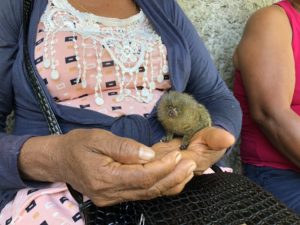
this is a little leoncillo monkey, waiting on a patient’s lap. He has little bits of fruit in his mouth
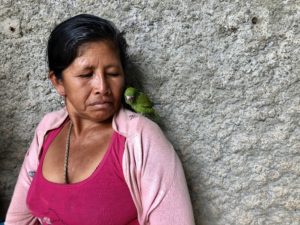
patient with a baby parrot that had been recently taken from its nest
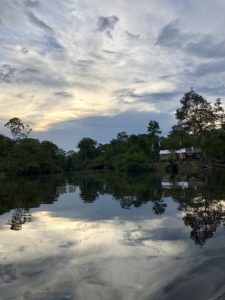
Huiririma, where the black water serves as a mirror

you can see where the brown Napo river meets the black Huiririma river
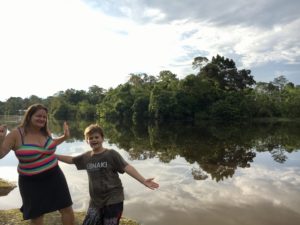
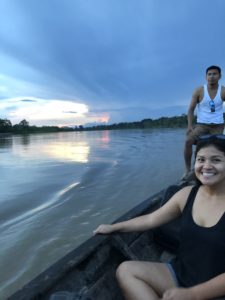
the ride home, with LIz and Jens
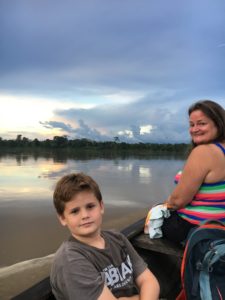
Keep these coming. Incroyable.
Comments are closed.